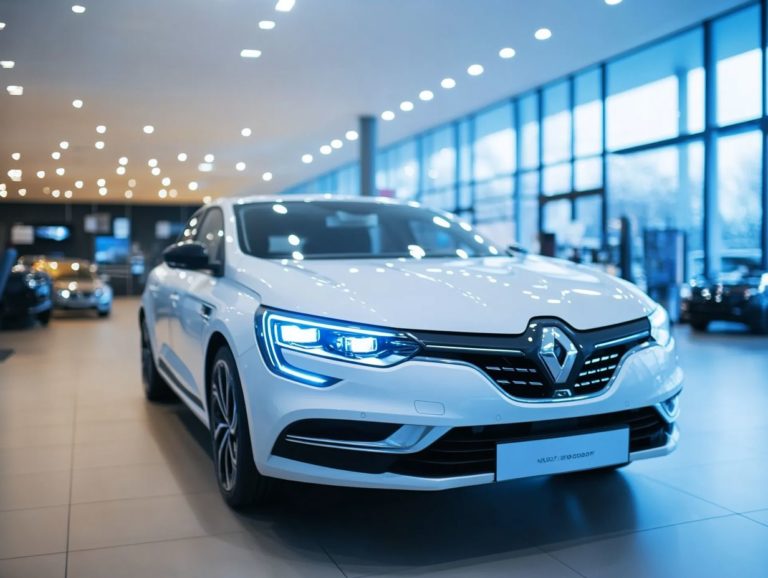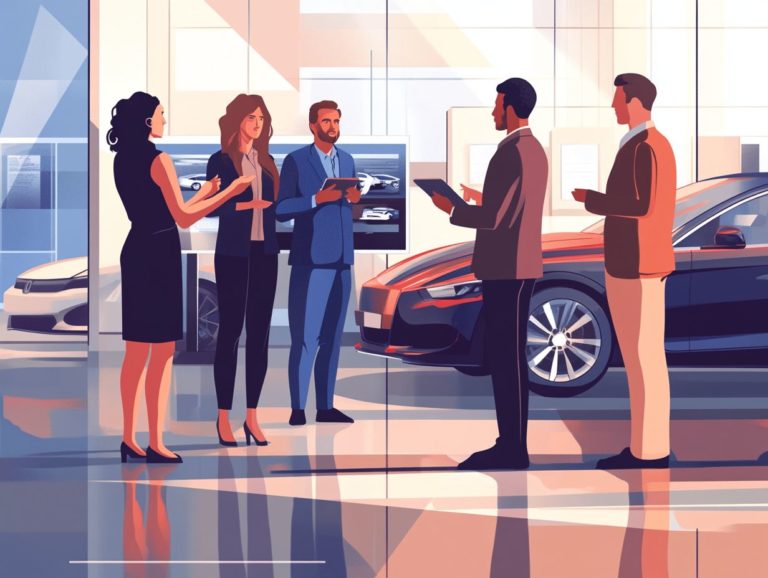How to Decide Between Buying and Leasing
Deciding whether to buy or lease a vehicle can feel overwhelming, especially with the many factors to consider.
Both options present distinct advantages and disadvantages that can significantly impact your finances and lifestyle. This article delves into the pros and cons of buying versus leasing, examining everything from long-term equity building to the appeal of lower monthly payments.
Key considerations, such as your personal financial situation and vehicle preferences, will also be explored to guide you in making an informed choice. Whether you re a first-time buyer or a seasoned driver, understanding these elements will empower you to select the path that best suits your needs.
Contents
- Key Takeaways:
- Pros of Buying
- Cons of Buying
- Pros of Leasing
- Cons of Leasing
- Factors to Consider Before Deciding
- Frequently Asked Questions
- What factors should I consider when deciding between buying and leasing a car?
- Is it better to buy or lease a car if I have a limited budget?
- How long should I plan to keep the car if I decide to buy?
- Are there any mileage restrictions when leasing a car?
- Can I negotiate the price when leasing a car?
- What are the pros and cons of buying and leasing a car?
Key Takeaways:

Buying offers long-term ownership and the ability to build value over time, while leasing allows for lower monthly payments and the chance to upgrade to newer models. Consider your personal financial situation and vehicle needs before deciding between the two options. Leasing may come with limitations on mileage and customization, but it also offers lower maintenance costs. On the other hand, buying involves higher upfront costs and the risk of depreciation. Weigh the pros and cons of each option carefully and choose what s best for your individual circumstances.
Understanding the Difference
Understanding the difference between buying and leasing a vehicle is essential for making an informed financial decision. While both paths grant you access to a car, they cater to different needs, preferences, and financial situations.
When you buy, you take ownership of the vehicle, allowing you to build value over time as you pay off the loan. You also have the freedom to customize it as you see fit. Conversely, leasing generally comes with lower monthly payments and added flexibility, though it may impose mileage restrictions and doesn t grant you ownership.
This choice significantly impacts not just your immediate costs, but also your long-term financial landscape. Once you pay off the auto loan, you own the vehicle outright, freeing you from monthly payments and allowing for potential trade-in value down the line.
Maintenance responsibilities fall squarely on you as the owner, giving you both the obligation and the freedom to modify the car. On the other hand, leasing often simplifies maintenance; many expenses are covered during the lease term, easing some of your worries.
Leasing typically means ongoing monthly payments without acquiring an asset, which can add up to a significant amount over time, leaving you with limited options once the lease concludes. Grasping these nuances can greatly assist you in navigating your vehicle financing choices.
Pros of Buying
The advantages of purchasing a vehicle are compelling, particularly when it comes to long-term ownership and the opportunity to build equity, which is the value you build in a car over time as you pay off the loan.
When you decide to buy a car, you gain complete control, giving you the power to customize and personalize it to reflect your individual tastes and needs.
Once you pay off the auto loan, you own the vehicle outright, freeing you from monthly payments and opening up the possibility of trade-in value down the line. This choice also offers greater flexibility regarding maintenance and repairs, as you re not limited by any leasing company’s rules.
Now is the time to weigh your options carefully and choose what s best for your future!
Long-Term Ownership and Equity Building
Long-term ownership offers a remarkable advantage when purchasing a vehicle. It allows for the gradual accumulation of equity, transforming your vehicle into a savvy financial investment.
As you carefully pay off your auto loan, you may see your vehicle s value depreciate. However, the equity you build can be substantial, especially when you think about the possibilities for future trade-ins.
This financial benefit becomes clear once the loan is paid off. At that point, you can sell the vehicle and recoup a portion of your initial investment.
Understanding how long-term ownership fits into your overall financial health is essential. Over time, consistent loan payments not only boost your equity but also alleviate the financial burden of potential repairs that come with older vehicles.
To enhance your trade-in value, consider implementing these strategies:
- Maintain your vehicle’s condition through regular maintenance and cleaning.
- Stay informed about market trends.
- Time your sale effectively to optimize financial returns.
Such efforts can significantly influence your resale price. By managing the depreciation curve while maximizing trade-in value, you strengthen your financial portfolio.
Freedom to Customize and Personalize
The freedom to customize and personalize your vehicle is one of the most compelling advantages of ownership. It allows you to express your unique style and driving preferences fully.
Unlike leasing, where modifications may be limited, owning your car grants you the liberty to select features, colors, and upgrades without restrictions. This personal touch enriches your driving experience and can enhance the vehicle’s value if you decide to sell it later.
Exploring various personalization options opens a world of possibilities. Consider aesthetic changes like dazzling paint jobs and bespoke wheels, as well as performance upgrades that amplify speed and handling.
Look into adding a top-notch sound system or integrating advanced tech features like infotainment systems tailored to your specific needs. These modifications not only allow you to shine as an individual but also instill a sense of pride in your ownership. Certain enhancements can appeal to future buyers, potentially increasing your vehicle’s market value.
Your journey of personalization isn t merely a choice; it s a meaningful investment in both your ride and your identity.
Cons of Buying

While purchasing a vehicle offers numerous benefits, it s important to consider the drawbacks as well.
Higher upfront costs can be a significant hurdle. Coupled with the reality of depreciation, this can profoundly influence your financial choices.
As you navigate the car-buying process, the initial down payment and overall expenses may feel intimidating, making the decision less accessible for some buyers.
As the vehicle ages, maintenance costs often escalate. The necessity for repairs can accumulate rapidly, resulting in a persistent financial burden that leasing typically avoids.
Higher Upfront Costs and Depreciation
Higher upfront costs and depreciation are two significant hurdles you may face when considering vehicle ownership. They can weigh heavily on your financial decision.
The initial down payment for an auto loan can feel daunting, especially if you’re eyeing luxury vehicles, which tend to depreciate more rapidly than their non-luxury counterparts.
As your car loses value, you may feel disheartened by the dwindling equity that comes with ownership. Studies show that luxury cars can lose about 20% of their value within the first year, while standard vehicles typically see a depreciation of around 15%. This gap affects luxury vehicle owners emotionally and creates a considerable financial burden when it comes time to sell or trade in.
If you’re considering larger vehicles like SUVs or trucks, be aware that the additional costs of higher insurance premiums and maintenance can compound the financial strain. When reconciling these expenses against your budget, the appeal of that shiny new vehicle may quickly fade.
It s essential to assess the total investment thoroughly, rather than just fixating on the initial purchase price.
Pros of Leasing
Leasing a vehicle offers many advantages. The biggest draw is lower monthly payments and reduced maintenance costs.
Leasing usually requires a smaller down payment and lower monthly fees. This allows you to enjoy a new car without the financial burden of ownership.
Many leasing agreements include maintenance coverage. This provides peace of mind as you drive and makes the return process easier when the lease ends.
Lower Monthly Payments and Maintenance Costs
One major benefit of leasing is the lower monthly payments. This can make financial decisions easier for you.
Many leases include maintenance costs, which means fewer worries about unexpected repairs. This combo of lower payments and covered maintenance makes leasing a smart choice.
Leasing typically offers a more predictable monthly payment. This allows you to budget your finances better and potentially afford a higher-end vehicle.
With maintenance covered, you can enjoy your vehicle without stress from repair bills. This is why leasing is becoming more popular.
Ability to Upgrade to Newer Models
Upgrading to newer models is another advantage of leasing. You can enjoy the latest technology without a long-term commitment.
Leasing makes it easy to switch vehicles every few years. This way, you always have access to the newest models and features.
As technology advances quickly, leasing lets you benefit from new safety features and better fuel efficiency. This can save you money in the long run.
If your lifestyle changes, leasing allows you to adapt. You can welcome new family members or move to areas with different driving needs without being tied down.
Many consumers find that leasing meets their needs while being smart financially. It helps with budgeting and reduces the risks of depreciation.
Cons of Leasing

Leasing has its drawbacks. These include limited mileage and restrictions that could affect your driving experience.
Most leasing agreements have strict mileage limits. Exceeding these can lead to unexpected fees.
If your situation changes and you need to end your lease early, you may face penalties. This can complicate your finances.
It s important to consider these factors when looking into leasing options.
Limited Mileage and Restrictions
Limited mileage and restrictions are significant drawbacks to leasing a vehicle. Many leasing agreements come with strict limits that can quickly become problematic for those who drive frequently.
Exceeding the allotted mileage often results in hefty fees, turning what seemed like a savvy financial decision into an unexpected burden. If you value flexibility in your driving habits, these restrictions can feel quite confining.
This dilemma can profoundly affect your daily life, especially if you depend on your vehicle for work, family obligations, or spontaneous road trips. The stress of tracking your mileage can transform enjoyable drives into tense calculations, where each outing feels like a race against the clock and the budget.
The financial consequences of surpassing these mileage caps can introduce an unwelcome layer of unpredictability into your budgeting. This reality might lead you to reconsider whether a lease aligns with your mobility needs.
Ultimately, you ll need to weigh the advantages of driving a newer car against your actual driving habits to make an informed choice.
Factors to Consider Before Deciding
Before you make the choice between buying or leasing a vehicle, it’s crucial to carefully consider several factors, including your personal financial situation and your unique vehicle needs. Exploring the pros and cons of buying vs. leasing a new car can help you make an informed decision.
Familiarize yourself with your credit score and its implications on your financing options. This knowledge can greatly shape your decision-making process. Evaluate the down payment requirements and how they fit within your budget to guide you in selecting the most suitable option for acquiring your next car.
Personal Financial Situation
Your personal financial situation is an important factor when deciding whether to buy or lease a vehicle, as it directly influences your ability to manage monthly payments and other associated costs.
A robust credit score can elevate your financing options, making it simpler to secure favorable loan terms or attractive leasing offers. If you’re navigating budget constraints, leasing might present a more manageable route, given its lower upfront costs and monthly fees.
Assess your credit score beforehand, as a higher score typically translates to better interest rates, impacting the overall cost of ownership. Craft a comprehensive budget that factors in insurance, maintenance, and fuel; these elements can significantly reshape your total monthly expenditure.
As a prospective buyer or lessee, weigh potential expenses such as depreciation when purchasing or mileage limits when leasing. This careful thought will guide you to the best choice for your future!
Vehicle Needs and Preferences
Understanding your vehicle needs and preferences is crucial when weighing the decision between buying and leasing, as it can greatly impact your financial outcomes.
If you value long-term ownership and the freedom to customize your ride, purchasing might be the way to go. On the flip side, if you relish the idea of driving the latest models and crave flexibility in your vehicle selection, leasing could align perfectly with your lifestyle.
Consider a growing family; they may gravitate toward purchasing a spacious SUV, appreciating its durability and practicality over the years while having the freedom to modify it as their needs evolve.
Alternatively, a commuter who thrives on variety and revels in cutting-edge technology might find leasing irresistible, allowing them to upgrade to a newer, feature-packed vehicle every few years without the burdens of ownership.
For those who tend to rack up high mileage, the risk of exceeding lease limits becomes a real concern, making buying a more sensible choice in such situations.
Watch this quick video for more insights on whether to buy or lease!
Frequently Asked Questions

What factors should I consider when deciding between buying and leasing a car?
There are several factors to consider when deciding between buying and leasing a car, including your budget, desired length of ownership, driving habits, and future plans.
Is it better to buy or lease a car if I have a limited budget?
If you have a limited budget, leasing may be a better option as it typically requires lower monthly payments and often doesn’t require a down payment. However, keep in mind that you do not own the car at the end of a lease, unlike buying.
How long should I plan to keep the car if I decide to buy?
Decide how long you want to keep your car. If you keep cars for many years, buying might be better.
Are there any mileage restrictions when leasing a car?
Yes, leasing agreements often limit you to 10,000 to 15,000 miles each year. Exceeding these limits may incur extra fees.
Can I negotiate the price when leasing a car?
Yes, you can negotiate the price when leasing a car. This means you can discuss the monthly cost, initial payment, and the length of the lease.
What are the pros and cons of buying and leasing a car?
Buying a car means you own it! Enjoy no mileage limits and possibly lower costs over time.
Leasing offers lower monthly payments and no long-term commitment. You can also drive a new car every few years!
However, buying comes with higher upfront costs and potential maintenance fees. Leasing has mileage restrictions and you won’t own the car at the end.
Now that you know the differences, it s time to make the best choice for your driving adventures!






